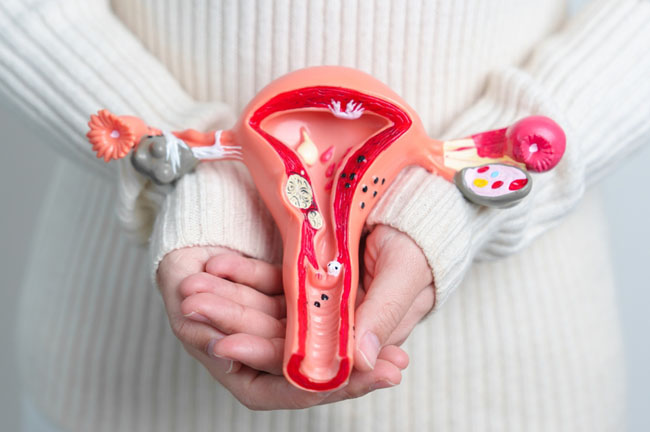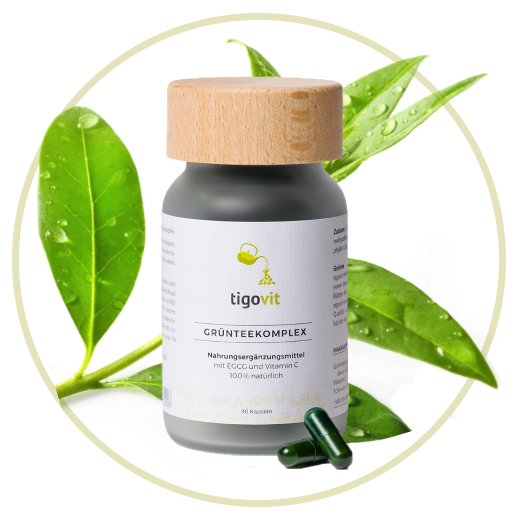
Interview mit Heilpraktikerin Iris Lemke
Das Polyzystische Ovarialsydrom, kurz PCO oder PCOS, ist die am häufigsten vorkommende hormonelle Störung bei Frauen im gebärfähigen Alter. Bedingt durch ein Überwiegen männlicher Geschlechtshormone wie Testosteron äußern sich die Symptome in ausbleibenden Menstruationsblutungen oder sehr lange Monatszyklen, in Fruchtbarkeitsstörungen, Gewichtszunahme, depressiven Verstimmungen sowie in vermehrter Körper- und Gesichtsbehaarung, Akne und Haarausfall am Kopfhaar. Im Blutbild ist oft ein erhöhter Androgenindex und erhöhtes Testosteron festzustellen. Das meist eher männliche Erscheinungsbild lässt viele Frauen zusätzlich psychisch leiden. Die Symptome müssen weder alle gleichzeitig noch besonders stark auftreten, jedoch weisen mindestens zwei der Kriterien auf die “polyzystischen Ovarien” hin, sprich Zysten an den Eizellen, die in den Eierstöcken nicht vollständig heranreifen und damit auch kein Eisprung auftritt.
In den letzten Jahren ist die Zahl der betroffenen Personen deutlich angestiegen. In einem Experteninterview mit der auf Frauengesundheit und Kinderwunsch spezialisierten Heilpraktikerin Iris Lemke aus Berlin berichtet die PCO-Expertin einen drastischen Anstieg der Symptome ihrer Patientinnen. Betroffen sind deutschlandweit etwa 5 bis 12% der Frauen, wobei sie “eher 10%, Tendenz steigend” in ihrer Praxis vermerkt.
Was genau ist also PCO? Wie entsteht diese endokrine Störung? Wie kann PCO ganzheitlich und nachhaltig behandelt werden? In diesem Artikel werden mögliche Ursachen und bewährte Therapieansätze vorgestellt, um dem aus der Balance geratenen Hormonsystem die Möglichkeit zu geben, zurück ins Gleichgewicht zu navigieren. Ein ganzheitlicher Ansatz aus Stressreduktion, Stabilisierung des Blutzuckerspiegels, Ernährungsumstellung und mentalen wie emotionalen Techniken liefert ein sicheres Fundament für ein Leben in Balance und für mehr Wohlbefinden – jeden Tag.
Was ist das PCO-Syndrom?
Charakteristisch sind die in bildgebenden Verfahren festzustellenden Zysten an den Eierstöcken (lat. Ovarien), die einer Perlenschnur ähneln. Die sichtbar nicht vollständig herangereiften Follikel, die in den Eierstöcken sitzen, werden durch hormonelle Fehlregulation am Eisprung gehindert. Normalerweise wird der Eisprung (Ovulation) alle 28 Tage durch das Ansteigen der Hormone FSH, LH und Östrogen ausgelöst. Ein ausbleibender Eisprung führt zu einer ausbleibenden Monatsblutung, da nur das im Eileiter befindliche Ei als Gelbkörper durch die Produktion von Progesteron dafür sorgt, dass die Gebärmutterschleimhaut aufgebaut wird und in der Monatsblutung abgestoßen wird, wenn das Ei unbefruchtet bleibt.
Was sind mögliche Ursachen von PCOS?
- Stress und Überlastung der Nebennieren
 Laut der in Berlin und Wandlitz praktizierenden Heilpraktikerin, Frauengesundheits-, Hormon- und Kinderwunsch-Spezialistin Iris Lemke sind die Ursachen bis heute nicht vollständig verstanden und geklärt. Sie beobachtet jedoch durchweg ein deutlich erhöhtes Stresslevel, bereits bei jungen Mädchen. Frauen müssen und wollen viel leisten, müssen bereits früh “ihre Frau stehen”. Ein gutes Abi schaffen, Job, Freizeitaktivitäten und eine harmonische Beziehung mit Partner und Familie, einen erfüllten Kinderwunsch sowie persönlich-berufliche Erfüllung.
Laut der in Berlin und Wandlitz praktizierenden Heilpraktikerin, Frauengesundheits-, Hormon- und Kinderwunsch-Spezialistin Iris Lemke sind die Ursachen bis heute nicht vollständig verstanden und geklärt. Sie beobachtet jedoch durchweg ein deutlich erhöhtes Stresslevel, bereits bei jungen Mädchen. Frauen müssen und wollen viel leisten, müssen bereits früh “ihre Frau stehen”. Ein gutes Abi schaffen, Job, Freizeitaktivitäten und eine harmonische Beziehung mit Partner und Familie, einen erfüllten Kinderwunsch sowie persönlich-berufliche Erfüllung.
Einer der gravierendsten Stressoren ist ein erhöhter bzw. stark schwankender Blutzuckerspiegel durch entweder Auslassen von Mahlzeiten oder Nahrungsmittel mit hohem glykämischen Index, welche nicht nur zuckerhaltige Süßigkeiten sind. Auch unregelmäßiger Schlaf, zu wenig Pausen an der frischen Luft und Erholung in der Natur, extrem erhöhte Aktivität und Leistungssport aber auch Fehlbesiedlungen im Darm und Entgiftungsstörungen sind Stressoren.
Eine dauerhaft erhöhte Stressbelastung bedeutet eine ständige Produktion der Stresshormone Adrenalin und Noradrenalin in der Nebenniere, die unter anderem ebenfalls Produktionsstätte für Hormone des weiblichen Zyklus ist. Wird die Hypophysen-Nebennieren-Achse, der Stress-Regulationsachse zwischen der Hypophyse im Gehirn und der Nebenniere, pausenlos gefordert, kann es zu Störungen der Sexualhormonregulation kommen. Diese erfolgt über ein Hormonsystem der sogenannten Hypophysen-Gonaden-Achse zwischen Gehirn, Nebennieren sowie Eierstöcken und steuert die komplexe Regulation der Geschlechtshormone, des Zyklus, der Eireifung, des Eisprungs und ggf. der Schwangerschaft.
Das Heranreifen einer Eizelle und der Eisprung kann der Körper nur leisten, wenn das System ausreichend Energieressourcen signalisiert, die theoretisch eine gesunde Schwangerschaft garantieren. Wenn der Körper jedoch statt regelmäßiger Ruhezeiten ständig neue Reize und To-Dos erhält, bekommt das Hormonsystem der Reproduktion automatisch das Signal, stressbedingt nicht ausreichend Kapazitäten für das Heranwachsen neuen Lebens zur Verfügung zu haben. Das Überleben des eigenen Systems hat Vorrang vor der Reproduktion, ein uralter Überlebensinstinkt.
Zudem kann sich stressbedingt das Gleichgewicht männlicher und weiblicher Hormone derart verschieben, dass die Androgene, also die männlichen Geschlechtshormone wie Testosteron, Überhand gewinnen und das Östrogen nicht ausreichend Einfluss hat, um Eireifung und Eisprung auszulösen.
- Erhöhtes Testosteron
Testosteron und Östrogen werden aus demselben Grundmolekül synthetisiert, dem Prohormon DHEA. DHEA wird durch Enzyme zuerst in Testosteron, dann in Estradiol umgewandelt. Estradiol ist ein wichtiges Östrogen, während Testosteron ein männliches Geschlechtshormon ist. Aus verschiedenen Gründen kann beispielsweise ein DHEA-Mangel entstehen, sodass insgesamt weniger Testosteron und Östrogen produziert werden. Zudem kann die Umwandlung von Testosteron in Estradiol gestört sein, weshalb ein Überwiegen von Testosteron gegenüber Östrogen entstehen kann, was wiederum Nährboden für die PCO-Merkmale liefert. Erhöhtes Testosteron sorgt für verstärkten Haarwuchs am Körper und im Gesicht, z.B. Bartwuchs, Haare am Bauchnabel und um die Brustwarzen, kann zu Akne führen und den eher für Männer charakteristischen Haarausfall und die hohe Stirn herbeiführen.
- Inhibin, Insulin und Übergewicht
Inhibin ist ein Hormon, das in den Eierstöcken produziert wird. Es hemmt die Freisetzung des follikelstimulierenden Hormons (FSH) aus der Hypophyse und sorgt im regulär ablaufenden Monatszyklus dafür, dass nicht alle Follikel gleichzeitig voll heranreifen, sondern nur eine oder zwei Eizellen zum Eisprung kommen. PCOS kann einen gestörten Inhibinspiegel mit sich bringen, was zu Ungleichgewichten im Zusammenspiel der Hormone führt, die den Menstruationszyklus regulieren.
Zudem stimulieren die bei PCO erhöhten Androgenspiegel das Wachstum der Eierstockfollikel. Das bedeutet eine erhöhte Inhibin-Produktion, damit eine Hemmung von FSH und eine gehemmte Reifung der Follikel, was zu den für PCOS charakteristischen Zysten führt. Folglich trägt das gestörte Inhibin-FSH-Gleichgewicht zu unregelmäßigen Eisprung- und Menstruationszyklen bei.
Personen mit PCOS weisen außerdem häufig eine Insulinresistenz auf, was bedeutet, dass die Zellen weniger auf Insulin reagieren. Reduzierte Insulinsensitivät kann unter anderem durch Übergewicht, hormonelle Imbalancen oder zucker- und kohlenhydratreiche Ernährung entstehen. Reduzierte Insulinsensitivität kann zu einem höheren Insulinspiegel im Blutkreislauf führen und damit zur Überproduktion von Androgenen in den Eierstöcken beitragen, was wiederum die Produktion von Inhibin anregt und damit die Entstehung der PCO-typischen Zysten an den Eierstöcken. Laut Iris Lemke haben etwa 50% der PCO-Frauen ihrer Praxis eine im Blutbild nachweisbare Insulinresistenz und sind übergewichtig.
PCO behandeln, ganzheitlich navigieren
 Zuallererst sollte bei einer Diagnose von PCO medizinische Begleitung einer Gynäkologin oder Heilpraktikerin aufgesucht werden, anstelle im Alleingang die Ernährung umzustellen und Präparate einzunehmen. Wichtig ist in jedem Fall, eine Therapie aus mehreren Komponenten zusammenzustellen, die immer mit oftmals zu Beginn drastischen Umstellung des Lebensstils zusammenhängen.
Zuallererst sollte bei einer Diagnose von PCO medizinische Begleitung einer Gynäkologin oder Heilpraktikerin aufgesucht werden, anstelle im Alleingang die Ernährung umzustellen und Präparate einzunehmen. Wichtig ist in jedem Fall, eine Therapie aus mehreren Komponenten zusammenzustellen, die immer mit oftmals zu Beginn drastischen Umstellung des Lebensstils zusammenhängen.
- Ernährung: Blutzucker stabilisieren & durch Nahrungsergänzung unterstützen
An erster Stelle steht bei der festgestellten Diagnose von PCOS eine Ernährungsumstellung auf dem Therapieplan. “Auf Zucker, glutenhaltige Backwaren und Pasta, Alkohol und oft auch Milchprodukte muss während der Heilungsphase unbedingt verzichtet werden”, so Iris Lemke. “Das ist für viele erst einmal erschreckend, der Körper bedankt sich jedoch bereits nach wenigen Wochen Durchhalten merklich und erste Erfolge motivieren die Patientinnen zum Weitermachen.”
Eine ausgewogene und vor allem regelmäßige Ernährung bedeutet vor allem, Blutzuckerspitzen im Blut nach dem Essen zu sowie Tiefs durch das Auslassen von Mahlzeiten zu vermeiden. Idealerweise ist mit jeder Mahlzeit jeden Tag dem Körper nur das zuzuführen, was er braucht, um in Balance zu sein. Vollwertkost, viel Gemüse, mageres Eiweiß aus Fisch, Hülsenfrüchte und gesunde Fette sollten Hauptkomponenten des Speiseplans sein. Auf Zucker, Alkohol, Gluten, Milchprodukte und verarbeitete Lebensmittel sollte verzichtet werden. Die mediterrane Diät reich an Antioxidantien, gesunden Eiweißen und Fetten eignet sich beispielsweise hervorragend. Besonders wichtig sind Lebensmittel und Mahlzeiten mit niedrigem glykämischem Index (GI), um den Blutzuckerspiegel zu stabilisieren und einer Insulinresistenz entgegenzuwirken. Was nicht durch die Ernährung aufgenommen werden kann, oder eventuell im Mangel ist, sollte durch geeignete Nahrungsergänzungsmittel und Vitaminpräparate zugeführt werden. Wichtig ist beispielsweise Vitamin B6 zur Unterstützung der Hormonregulation, für Nerven, Psyche, Energiestoffwechsel und Immunsystem. Auch gibt es viele bewährte Pflanzenstoffe, die in Absprache mit der behandelnden Therapeutin eingesetzt werden sollten.
Eine Ernährungsberaterin oder die behandelnde Medizinerin in die Erstellung des Speiseplans und individuelle Einstellung geeigneter Nahrungsergänzungsmittel zu Rate zu ziehen, garantiert nicht nur einen individuell zugeschnittenen Therapieplan, sondern schafft auch die Motivation, dranzubleiben, da man nicht alles alleine schaffen muss.
- Bewegung und körperliche Aktivität
Regelmäßige Bewegung unterstützt, die Insulinsensitivität zu verbessern, das Gewicht zu kontrollieren und Stress abzubauen. Ideal ist eine Kombination aus Kardio-Übungen oder Joggen, Krafttraining und Entspannungsübungen wie Yoga oder Meditation. Wichtig ist, dass es Spaß macht, denn so ist es einfacher, dranzubleiben und die neuen Routinen nachhaltig und mit Erfolgserlebnissen in den Alltag zu integrieren.
- Stressreduktion und mentale Gesundheit kultivieren
Nicht selten bringt eine PCOS-Diagnose depressive Verstimmungen und psychische Symptome mit sich, sowie Müdigkeit und Angstzustände. Reduktion von psychischem Stress ist ein weiterer wichtiger Punkt in der erfolgreichen Therapie von PCOS. Es kann sinnvoll sein, professionelle psychologische Beratung heranzuziehen und weitere Stressbewältigungstechniken und Achtsamkeit im Alltag zu kultivieren, das Selbstwertgefühl zu stärken, Pausen zu machen und dem Körper wieder beizubringen, wie sich Entspannung und Loslassen anfühlt und vor allem, dass er die Erlaubnis dazu hat. Wunderbare Tools sind ausgiebige, tiefenentspannende Massagen, Meditationen oder auch Selbsthilfegruppen zum Austausch und Etablieren von emotionalem Wohlbefinden. Ebenfalls unerlässlich für die Hormonregulation und damit auch bei der Behandlung von PCO ist gesunder und erholsamer Schlaf. Effektive Stressbewältigungstechniken wie Atemtechniken, progressive Muskelentspannung und Zeitmanagement können dabei helfen, den Stresspegel zu senken und wirken sich nachhaltig positiv auf den Hormonhaushalt aus.
- Community – Austausch mit Gleichgesinnten
Über die eigene Leidensgeschichte offen zu sprechen und sich mit Gleichgesinnten und engen Bezugspersonen auszutauschen ist eine weitere wichtige Säule der Heilung von PCOS. Dem Körper wird signalisiert, dass er verstanden und ernst genommen wird. Es gibt eine ganze Reihe von Online-Communities, die sich mit dem immer häufiger vorkommenden Thema PCOS beschäftigen und sich gemeinsam den Herausforderungen stellen, sich unterstützen und Mut zusprechen. Erfahrungen, Tipps, Strategien und Unterstützung fördern das Zugehörigkeitsgefühl, Motivation und das Gefühl emotionaler Sicherheit.
PCO und Geduld – Nähren Sie Ihren Körper?
Meist entsteht eine endokrine Störung schleichend und kann genauso wenig von einem Tag auf den anderen dauerhaft behoben werden. Wir möchten hiermit daran erinnern, dass der Körper in Ruhe in sein ursprüngliches Gleichgewicht zurückfinden darf. Vertrauen Sie ihm und schenken Sie ihm Vertrauen, indem Sie entsprechend seiner Bedürfnisse handeln und ihn nähren. Das heißt nicht, ihn pausenlos zu füttern, sondern das eigene Wohlbefinden an erste Stelle zu setzen. Keine Mahlzeiten auslassen, nicht zu viel essen, den Blutzucker nicht in die Höhe schießen lassen, in Absprache mit Frauenärztin oder Heilpraktikerin mit geeigneten Supplementen und Nährstoffen unterstützen, rechtzeitig Stopp zu Chefs und Familie sagen, um keinen Stress entstehen zu lassen, Pausen machen, täglich Bewegung an der frischen Luft, Austausch in einer stabilen Gemeinschaft und ausreichend schlafen. Hormone lieben Stabilität und Zuverlässigkeit.
Quellen:
Gu Y, Zhou G, Zhou F, Wu Q, Ma C, Zhang Y, Ding J, Hua K. Life Modifications and PCOS: Old Story But New Tales. Front Endocrinol (Lausanne). 2022 Apr 13;13:808898. doi: 10.3389/fendo.2022.808898. PMID: 35498415; PMCID: PMC9045543.
https://www.msdmanuals.com/de-de/heim/gesundheitsprobleme-von-frauen/menstruationsst%C3%B6rungen-und-abnormale-scheidenblutungen/polyzystisches-ovarialsyndrom-pcos
https://www.rosenfluh.ch/media/gynaekologie/2012/01/das_pcosyndrom.pdf





Schreibe einen Kommentar